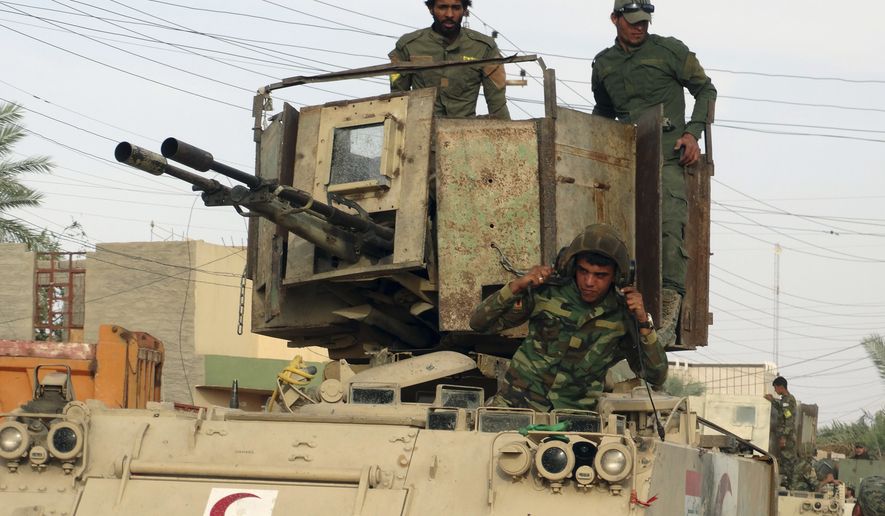The Iranian-backed terror group Hezbollah is preparing to pull its cadre of commanders and military advisers from Iraq, with the group’s leader saying Monday it had achieved its goal of defeating the Islamic State in the Middle East country.
During a televised address from Beirut, Hezbollah leader Hassan Nasrallah said its operations against ISIS in Iraq were coming quickly to an end, and the group needed to redeploy those commanders and advisers “in any other arena that needs them.”
Hezbollah fighters in Iraq will remain in place, for the time being, until Baghdad gives the official word that their forces are no longer needed in the country, Mr. Nasrallah said.
“Daesh is essentially done. Iraqi forces have made their way to the Syrian-Iraqi border. But we are waiting for the final victory. It is not far off that this will be announced or completed,” the terror group leader said Monday, using the derogatory Arabic term for ISIS.
“If we find that it’s over, that there is no need for the presence of these brothers, they will return,” he added during the televised address.
Mr. Nasrallah’s comments come days after Iraqi security forces and members of the Shia paramilitary groups known as Popular Mobilization Forces or PMFs, backed by American airpower, retook the northern Iraqi city of Rawa on Friday.
Located just over 60 miles from the Iraq-Syrian border, the town set along the banks of the Euphrates River was the last major ISIS redoubt in Iraq.
Top military commanders and military advisers from Hezbollah and the Iranian Revolutionary Guards Corps have provided arms, equipment, training and logistical support to the Shia militias — which were federalized under the Iraqi military by Prime Minister Haider al-Abadi last fall.
During his speech, Mr. Nasrallah personally praised the efforts of Iranian Gen. Qassem Suleimani, head of Quds Force, an elite faction of the IRGC who spearheaded Tehran’s military operations inside Iraq, Syria, Yemen and elsewhere across the Middle East.
“This big leader was present from the first day in this battle and yes, he was on the front lines of the battle and could have been martyred at any time,” Mr. Nasrallah said of Gen. Suleimani.
Hezbollah and Iranian military trainers have also conducted similar train and advise operations in support of Shia paramilitaries in Syria and Yemen. But Mr. Nasrallah’s announcement of a proposed Hezbollah withdrawal come amid growing concern in Baghdad over Tehran’s growing influence in the country, via its presence within the PMFs.
“Some have no problems, some have affiliations and loyalty” to Iran and not the central government in Baghdad, Iraqi Vice President Osama al-Nujaifi, the top government official representing the country’s Sunni minority, said in a speech in Washington last week regarding the Shia militias.
“They have their own political aspirations, their own [political] agendas,” he said. Acting as a “parallel force to the Iraqi military” under the direct control of Mr. Abadi, “they are very dangerous to the future of Iraq,” Mr. Nujaifi added.
Saleem al-Jubouri, speaker of the Iraqi parliament, went further by calling upon the Abadi regime to disband the majority of the Shia paramilitary groups, or risk sparking an outbreak of sectarian violence in the wake of ISIS’s defeat in Iraq.
“We need to bring balance to the Iraqi military” and larger security forces, he said last Thursday, noting that not all of the Shia paramilitaries organized underneath the banner of the PMF posed a threat to the country’s stability.
But the PMF factions, trained and armed by Iranian military advisers, and who take their queues from Tehran cannot continue to operate under the Iraqi flag, he said. “Those factions must be dissolved,” he added at the time.
• Carlo Muñoz can be reached at cmunoz@washingtontimes.com.




Please read our comment policy before commenting.